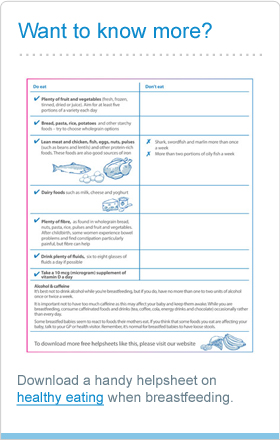| If you can't view this SMA Baby Club email click here |
 |
 |
 |
 |
|
| |
Feeling more confident?
Are you starting to get a little more routine in your days now? You may be starting to notice a pattern in how often and how long your baby feeds. If you’re lucky you may even be getting a bit more sleep at night!
Some babies bring up more milk than others during or just after feeds. As long as your baby is gaining weight, there’s usually nothing to worry about, but talk to your health visitor, public health nurse or GP if you are worried.
You can also try:
- Holding your baby upright for about 20 minutes after feeds
- Winding your baby in the middle of feeds as well as at the end
- If bottle-feeding, making sure you carefully follow the preparation instructions on the label
- Giving smaller, more frequent feeds
Now that your days are a bit more predictable you and your baby can concentrate on enjoying each other’s company. You may already have noticed your baby gazing intently at your face or listening with great interest to your voice. Any day now they’ll start to ‘coo’ and gurgle too. |
|
|
 |
|
Healthy eating when breastfeeding
On average, you will need up to 500 extra calories a day while breastfeeding. On our website you can see our healthy eating helpsheets but here is a handy summary:
- At least five portions of fruit and veg a day
- Starchy foods, such as bread, pasta, rice and potatoes
- Plenty of fibre
- Protein, such as lean meat and chicken, fish, eggs and pulses
- Fish at least twice a week, including some oily fish
- Dairy foods, such as milk, cheese and yoghurt
|
|
|
|
 |
|
| We answer hundreds of questions a week from parents. For free support and advice, get in touch via our new Live Chat service, call or email.
|
|
|
 |
|
|
Come and get to know us a little better. |
|
|
|
| Important Notice: Breast milk is best for babies and breastfeeding should continue for as long as possible. Good maternal nutrition is important for the preparation and maintenance of breastfeeding. Introducing partial bottle-feeding may have a negative effect on breastfeeding and reversing a decision not to breastfeed is difficult. You should always seek the advice of a doctor, midwife, health visitor, public health nurse, dietitian or pharmacist on the need for and proper method of use of infant milks and on all matters of infant feeding. Social and financial implications should be considered when selecting a method of infant feeding. Infant milk should always be prepared and used as directed. Inappropriate foods or feeding methods, or improper use of infant formula, may present a health hazard. |
|
All the best,
The SMA Baby Club |
|
|
|
 |
 |
 |
 |
 |
 |
|
Please do not reply to this email, as the mailbox is unmanned. For any help or assistance please contact our Careline team.
ZTC1095e/08/15
Nestlé UK Ltd & Nestlé (Ireland) Ltd ®Reg. Trademark |
|
 |
|